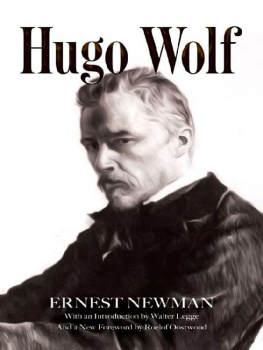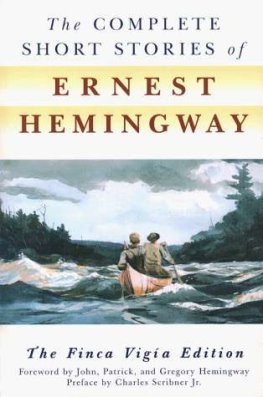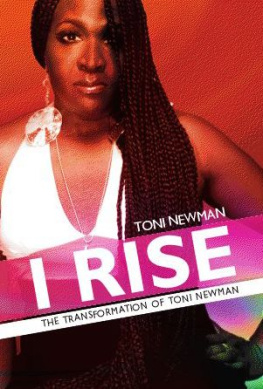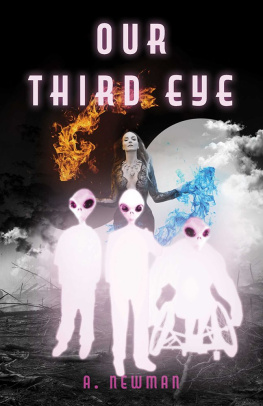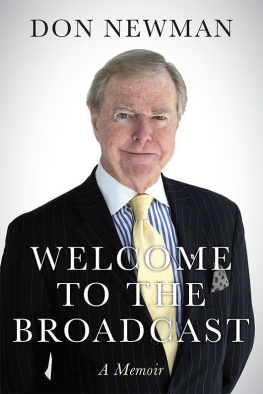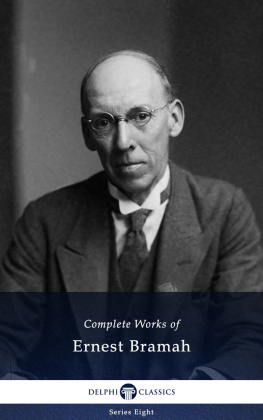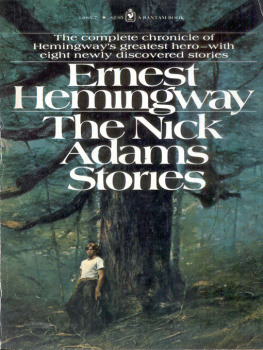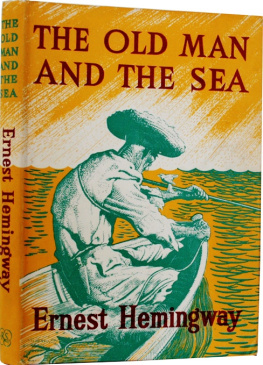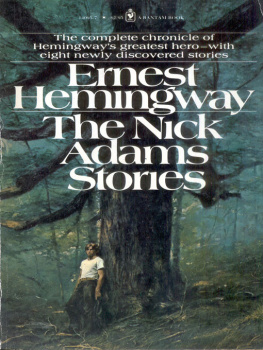Ernest Newman - More Stories of Famous Operas
Here you can read online Ernest Newman - More Stories of Famous Operas full text of the book (entire story) in english for free. Download pdf and epub, get meaning, cover and reviews about this ebook. year: 2013, publisher: Knopf Doubleday Publishing Group, genre: Science. Description of the work, (preface) as well as reviews are available. Best literature library LitArk.com created for fans of good reading and offers a wide selection of genres:
Romance novel
Science fiction
Adventure
Detective
Science
History
Home and family
Prose
Art
Politics
Computer
Non-fiction
Religion
Business
Children
Humor
Choose a favorite category and find really read worthwhile books. Enjoy immersion in the world of imagination, feel the emotions of the characters or learn something new for yourself, make an fascinating discovery.

- Book:More Stories of Famous Operas
- Author:
- Publisher:Knopf Doubleday Publishing Group
- Genre:
- Year:2013
- Rating:4 / 5
- Favourites:Add to favourites
- Your mark:
- 80
- 1
- 2
- 3
- 4
- 5
More Stories of Famous Operas: summary, description and annotation
We offer to read an annotation, description, summary or preface (depends on what the author of the book "More Stories of Famous Operas" wrote himself). If you haven't found the necessary information about the book — write in the comments, we will try to find it.
More Stories of Famous Operas — read online for free the complete book (whole text) full work
Below is the text of the book, divided by pages. System saving the place of the last page read, allows you to conveniently read the book "More Stories of Famous Operas" online for free, without having to search again every time where you left off. Put a bookmark, and you can go to the page where you finished reading at any time.
Font size:
Interval:
Bookmark:
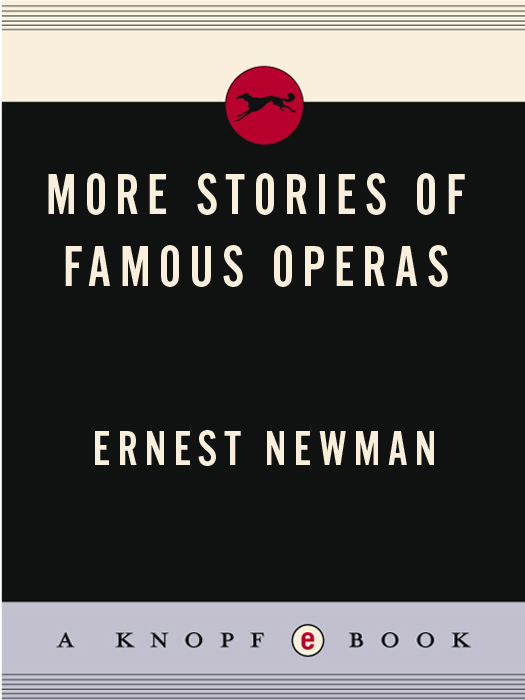
THE LIFE OF RICHARD WAGNER
| Volume I | 1813-1848 | (1933) |
| Volume II | 1848-1860 | (1937) |
| Volume III | 1859-1866 | (1941) |
| Volume IV | 1866-1883 | (1946) |
THREE VOLUMES OF OPERA ANALYSIS AND HISTORY:
MORE STORIES OF FAMOUS OPERAS (1943; known in England as Opera Nights)
(Turandot, Gianni Schicchi, The Barber of Bagdad, Thas, Eugen Onegin, Prince Igor, The Golden Cockerel, Elektra, Orfeo ed Euridice, Lakm, Les Huguenots, Cos fan tutte, The Seraglio, Les Troyens, Don Pasquale, La Juive, Manon, Falstaff, Louise, Pellas and Mlisande, The Bartered Bride, Die Fledermaus, Romeo and Juliet, Der Rosenkavalier, Cavalleria Rusticana, Pagliacci, Wozzeck, LHeure Espagnole, Boris Godounov)
THE WAGNER OPERAS (1949; known in England as Wagner Nights)
(The Flying Dutchman, Tannhuser, Lohengrin, Tristan and Isolde, The Master-singers of Nuremberg, The Nibelungs Ring [The Rhine gold, The Valkyrie, Siegfried, The Twilight of the Gods], Parsifal)
SEVENTEEN FAMOUS OPERAS (1955; known in England as More Opera Nights)
(Salome, La Bohme, The Barber of Seville, The Marriage of Figaro, Tosca, Fidelio, Don Giovanni, The Tales of Hoffmann, Carmen, Madam Butterfly, Der Freischtz, La Traviata, Rigoletto, Il Trovatore, Ada, Otello, The Magic Flute)
EDITED BY HERBERT VAN THAL:
TESTAMENT OF MUSIC (1963)
THESE ARE BORZOI BOOKS, PUBLISHED IN NEW YORK
BY Alfred A. Knopf
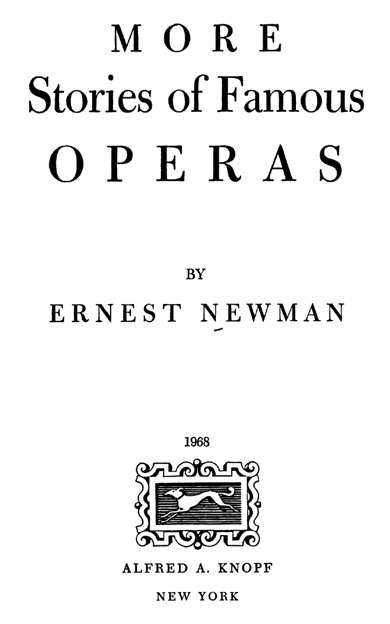
C opyright 1943 by Alfred A. Knopf, Inc. All rights reserved. No part of this book may be reproduced in any form without permission in writing from the publisher, except by a reviewer who may quote brief passages in a review to be printed in a magazine or newspaper.
Published March 1, 1943
eISBN: 978-0-307-83082-1
v3.1
TO
VERA

A LTHOUGH a point of aesthetic is now and then touched upon in the following pages, I wish it to be understood at once that this is not a book of musical criticism. Its object is severely practical to help the listener to opera, whether in the theatre or by radio, to get more value out of his listening.
We are assured by the armchair aestheticians that a work of art ought to be its own sufficient explanation, and no doubt in an ideal world it would be. But we have the misfortune to live in a world constructed on anything but ideal principles; and the number of large-scale dramatic works that explain themselves beyond question in mere performance is smaller than we are inclined to think. Take, by way of simple illustration, the dialogue between Lorenzo and Jessica at the commencement of the fifth act of The Merchant of Venice. Will it be contended that these lines yield the same suggestiveness, the same beauty, to the man supposing there to be such a man who has never heard of Troilus and Cressida and Dido and Medea as they do to the man in whom the merest mention of these names at once floods the imagination with memories of emotions kindled in him by other great poems and dramas? Is there not something of Cervantes in us each time we listen to the Don Quixote of Strauss, something however little of Goethe present with us when we listen to Faust or Mignon in the opera house? Could we, if we tried, listen to Corneliuss Abul Hassan Ali Ebn Bekar without seeing him enveloped in the aura of that immortal ancestor of his whom we know from the pages of The Thousand and One Nights?
Most people know, from their own opera-going or concert-going, how large a part previous experiences of this kind play in the sum total of their pleasure in such works as those I have mentioned. By inference, therefore, they must be missing, in the case of many a work for their insight into which they are dependent wholly on what they see and hear on the stage, a good deal of rather vital stuff which the librettist and the composer intended them to see and hear. This stuff was in the librettist and the composer when they conceived and executed the opera: without it their work would never have been just what it is: surely, then, it is necessary that it should be in us also when we see and listen, if our own imaginative apprehension of the work is to be as definite and as intense as theirs. Once more it is no use mumbling that the work of art ought to explain itself. Notoriously it does not, in a thousand cases that could be cited. It can be asserted dogmatically that very few modern operas founded on a pre-existent novel, poem or play really explain themselves. In general, so much of the original has had to be omitted in the shaping of the libretto, so much inserted in the stead of what was omitted, so many episodes transposed in time or place, that the situations, the characters and the psychological states of the opera sometimes bear only a superficial resemblance to the work of art on which it was based.
Quite so, it may be replied to this; but does that alter the fact that the opera and the drama (or novel) in question are two completely different organisms, inhabiting each a world of its own, living each according to the laws of its own being? Should not the opera organism be complete in itself, self-consistent, self-sufficing? And is it not sufficient for us to listen to the opera just as it is and take it for just what it is, not troubling our heads as to its nearness to, or remoteness from, the drama or novel from which its subject was derived? The answer to that would be, and could only be, precisely the one the questioner expects but for one little fact which cannot be left out of consideration. No matter how much or how little of Anatole Frances Thas, let us say, or of Prvosts Manon Lescaut, or of Gozzis Turandot there may be in Massenets Thas or Manon or in Puccinis Turandot, it still remains true that Frances novel and Prvosts story and Gozzis play were functioning in every brain cell of the opera poets and composers when they were fashioning their works. The infiltration of the original must have affected their own treatment of the subject in a thousand subtle ways. It is surely not superfluous, then, on the part of us listeners to go over again, in imagination, the ground they traversed so often before they reached their own goal.
If an opera invariably explained itself in performance there would be little need, of course, for books of the type of the present one. But operas, alas, are often far from explaining themselves, as we soon discover when we come to discuss this or that work with some one who has pursued it enthusiastically from theatre to theatre year after year but without ever having taken the trouble to read anything about it. People of this kind often have the quaintest ideas about a work which, they will assure us, they adore. It was not until a valued friend of mine, who had seen Wagners tetralogy each summer for several years, read at long last a Story of the
Font size:
Interval:
Bookmark:
Similar books «More Stories of Famous Operas»
Look at similar books to More Stories of Famous Operas. We have selected literature similar in name and meaning in the hope of providing readers with more options to find new, interesting, not yet read works.
Discussion, reviews of the book More Stories of Famous Operas and just readers' own opinions. Leave your comments, write what you think about the work, its meaning or the main characters. Specify what exactly you liked and what you didn't like, and why you think so.

